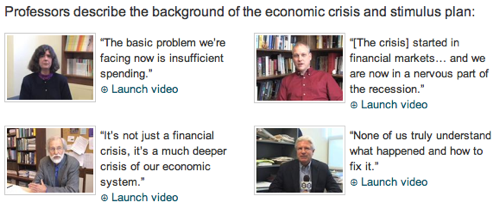![]() [EDITOR’S NOTE: We’re highlighting a few of the entries in this year’s Knight News Challenge, which just closed Tuesday night. Did you know of an entry worth looking at? Email Mac or leave a brief comment on this post. —Josh]
[EDITOR’S NOTE: We’re highlighting a few of the entries in this year’s Knight News Challenge, which just closed Tuesday night. Did you know of an entry worth looking at? Email Mac or leave a brief comment on this post. —Josh]
Jackie Hai traces the idea for 101 Source back to two projects she worked on while at the University of Massachusetts Amherst. Market Meltdown 101 and Economic Stimulus 101 were video-driven websites that featured economic experts explaining complicated ideas in plain language:

With 101 Source, Hai wants to apply a similar model to a variety of topics. If it receives funding, 101 Source would be a hybrid product that’s one part video platform (a la YouTube), one part “answer” service (like eHow or KGB), and one part editorial information source.
Here’s how it would work: A user submits a question; the 101 Source staff tracks down an expert, asks the question and films the answer; the resulting video clip is then posted and categorized on the website.
The most intriguing aspect of 101 Source is its commitment to information gathering. There are plenty of sites where random questions can be posed to a community. Heck, Twitter is great for that. But few (active) sites feed questions to a staff whose sole purpose is to track down reliable answers. The Wilmington Star-News’ MyReporter.com is an analog, but that is more journalist-driven than expert-driven.
Hai said 101 Source videos could be made available to news outlets. “We’re leaning toward running it as a nonprofit service,” she wrote in an email. “Ideally, I’d like to see something like the ProPublica model take shape, where we focus on producing useful content that can be distributed widely.”